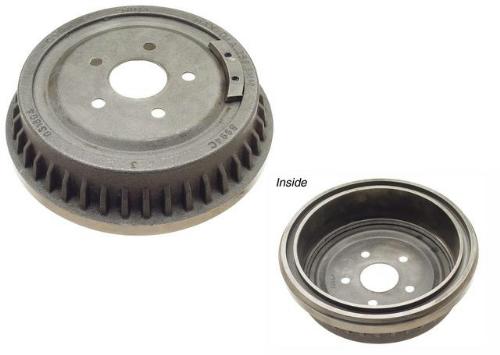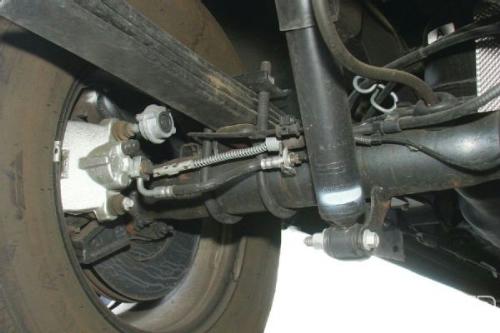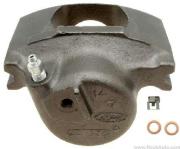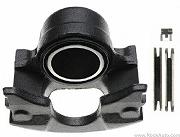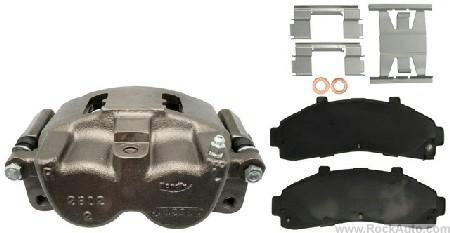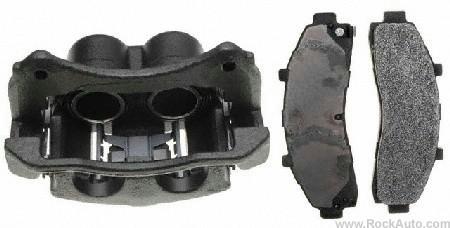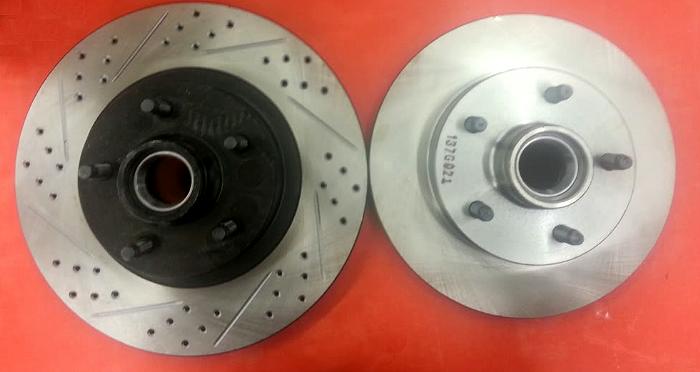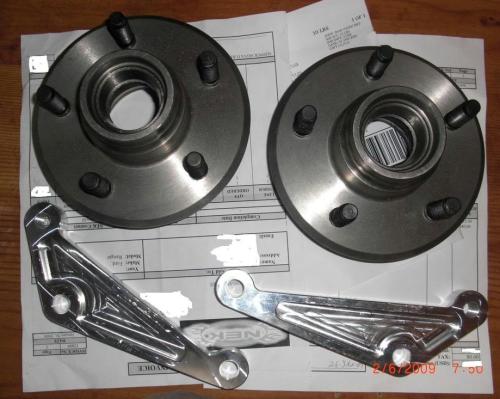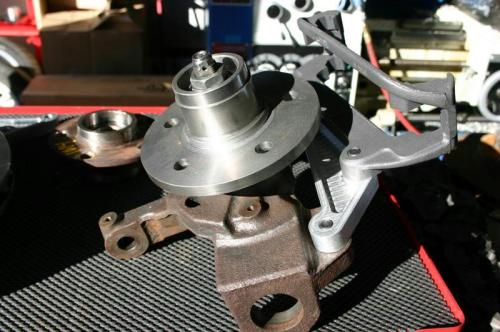Introduction
If you’re adding larger tires or just trying to improve the braking performance of your Ford Ranger, there a few modifications you can make. This page discusses those modifications.
Ford Ranger Rear Brakes
Ford Rangers come with a rear drum and front disk brake set-up from 1983-2009.
- GVWR over 4580 pounds use a 10-inch drum
- GVWR under 4580 pounds use a 9-inch drum
You can tell if you have a 9-inch or 10-inch brake drum by looking at the outer edge of the drum. If it’s smooth, then it’s a 10-inch drum. If it has ribs (fins), then it’s a 9-inch drum.
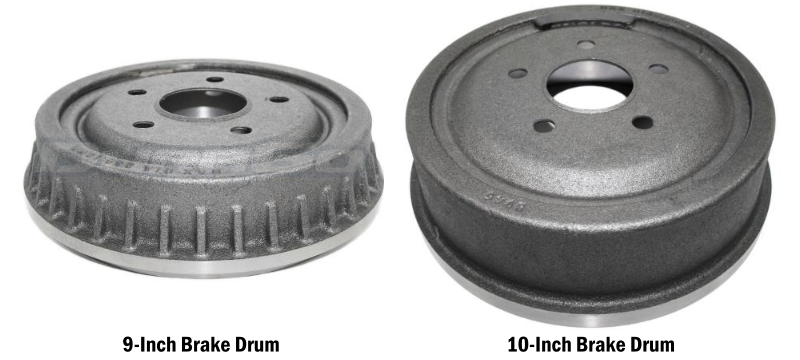
In 2010 and 2011, the Ford Ranger received rear disc brakes with 11-inch brake rotors.
In 1995, the Ford Explorer 31-spline 8.8-inch axle switched from a 10-inch rear drum to an 11-inch rear disc brake setup.
Rear Brake Drum Upgrade
You can upgrade your 9-inch drum brakes by swapping on the 10-inch backing plates, hardware, and brake drums from a Ford 7.5 or Ford 8.8 axle. The backing plates on 7.5 and 8.8 axles have a different bolt pattern and don’t interchange.
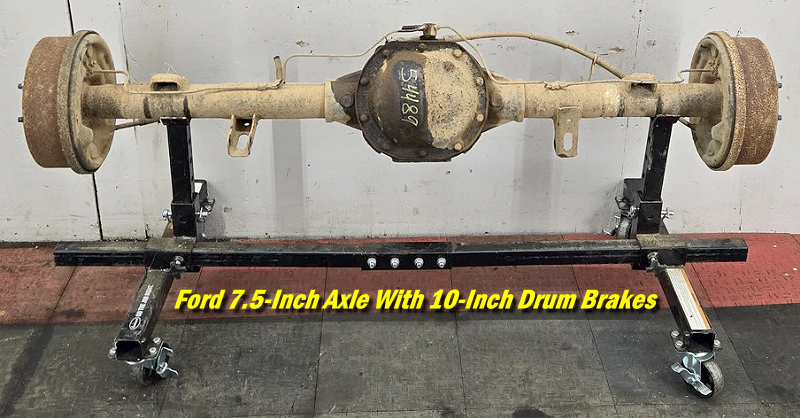
Retrofit 10-Inch Drums:
If you want to upgrade from the 9-inch rear drums to 10-inch rear drums, you’ll need the:
- Backing plate
- Wheel cylinders
- Emergency brake cable
- 10-inch drums
The wider 10-inch drums will not widen your rear track width. The backing plates for the 10-inch drums are offset so that it has the same width as the 9-inch brake drums.
Also, the Ford Ranger 7.5-inch axle and Ford Ranger 28-spline 8.8-inch axle have the same axle flange bolt pattern. So, a backing plate from a Ford Ranger 8.8 will fit a Ford Ranger 7.5.
10-Inch Ford Aerostar Brake Drum Upgrade
If you already have 10-inch drums (or you’re swapping to them), you can improve fade resistance by replacing your “smooth” 10-inch drums with the heavier ribbed drums that are specified for the 1993-1997 Ford Aerostar.
(Ford Aerostar 10-Inch Finned Brake Drum)
Factory Rear Discs:
For 2010 and 2011, the Ford Ranger came with rear disc brakes with an 11-inch rotor
(Factory rear disc brakes on 2010 Ford Ranger)
Upgrading A Rear Axle To Disc Brakes
Ford Ranger 28-Spline 8.8-Inch & 7.5-Inch Axles:
The most common way to add disc brakes to these axles has been to do the “Mustang Disc Brake Swap“. It’s not a direct bolt on because it requires some cutting, but it isn’t too difficult for the average guy that works on his truck.
Ford Ranger 31-Spline 8.8-Inch Axle (FX4):
You can swap in the disc brake components from a 1994-2001 Ford Explorer. You’ll need to grab everything from the backing plates forward.You’ll need to grab everything from the backing plates forward.
1990-1994 Ford Explorer 31-Spline 8.8-Inch Axles:
If you swapped in a 1990-1994 Ford Explorer 8.8-inch axle with drum brakes, you could swap all of the rear disc brake components from a later 1995-2001 ford Explorer. the 1995-2001 Discs bolt directly onto the 1991-1994 Explorer drum brake axle. You’ll need to grab everything from the backing plates forward. The 1995-2001 Discs DO NOT bolt to the Ford Ranger 8.8-inch axle.
Ford Ranger Front Brakes
Brake Rotors:
The Ford Ranger uses a 10.28-inch diameter, 0.850-inch-thick front brake rotor. The Ford Ranger 4×4 used the following rotors:
- Dana 28: 10.87″ Outside Diameter / 0.87″
- Dana 35 (1990-1994): 10.87″ Outside Diameter / 0.87″ Thick
- Dana 35 (1995-1997): 11.28″ Outside Diameter / 1.03″ Thick
Single Piston Brake Calipers:
The 1983-1994 front brake uses a single piston caliper with slide pins.
(Single Piston Caliper)
1995-1997 Dual Piston Caliper:
In 1995 the brake caliper was upgraded to a dual piston (2-piston) caliper, and the rotor was upgraded to 1.023 inches thick. The caliper bolts to the steering knuckle and does not use slide pins.
(Dual Piston Caliper)
Dual Piston Upgrade
1989-1994 Ford Ranger Dana 35: In order to add the dual piston (2-piston) caliper and larger rotor to your 1989-1994 Ford Ranger you swap over the 1995-1997 Ford Ranger steering knuckles, caliper brackets, calipers, rotors, and brake pads.
If you want the new brakes to be easy to connect on a 1989-1994 (and some late 1988’s) you need to order a NON-ABS Brake hose for the driver’s side from a 1997. 1997 was the ONLY year that ford made any non-ABS dual piston trucks (I have no idea why).
The 1989-1994’s without ABS use the frame end of the driver’s side brake hose as a T-block to split the brake line off the master cylinder to the left and right-side brakes (Thus the NON ABS hose). If on the other hand you have an ABS equipped 1993-1994 you want the ABS hoses.
1983-1988 Ford Ranger Dana 28: These axle beams are different than the 1989-1997 Dana 35 beams. You cannot swap dual piston calipers onto these axle beams.
1993-1997 Ford Ranger Dana 35 Hybrid: On a Dana 35 hybrid truck (Dana 35 beam with Dana 28 gears) you swap over the 1995-1997 Ranger steering knuckles, calipers, caliper brackets and rotors (the spindle, shaft, lockout hubs, etc are all the same and interchangeable).
12-Inch & 13-Inch Brake Rotors
12-Inch Brake Rotors: In 2003, the ford Explorer Sport Trac upgraded to a 12-Inch brake rotor. Some Ranger owners have found a way to convert their trucks to use this larger rotor. You will however need a 16-inch wheel to clear them.
(12-inch rotor left – Stock 10-inch rotor right)
To learn more, check out:
Sport Trac 12-Inch Rotor Upgrade For 2WD Ford Ranger
13-Inch Brake Rotors: There was a member (Tee Rev) at RPS that machined a hub and made a bracket to allow a 13-inch Mustang brake rotor to fit on the 1995-1997, and the 1999-2003 Ford Ranger. It would also work on the 1989-1994 Rangers if they were refitted with 1995-1997 steering knuckles. The kit is no longer sold.
Related Articles
Explorer 8.8 Rear Disc Brake Conversion
Ford Ranger / Bronco II Rear Disc Brake Conversion
Sport Trac 12-Inch Rotor Upgrade For 2WD Ford Ranger
Ford F-350 Master Cylinder Upgrade
Last Updated:
About The Author
Jim Oaks is the founder of TheRangerStation.com, the longest-running Ford Ranger resource online since 1999. With over 25 years of hands-on experience building and modifying Ford Rangers — including magazine-featured builds like Project Transformer — Jim has become one of the most trusted authorities in the Ford Ranger off-road and enthusiast space.
Since launching TheRangerStation.com, Jim has documented thousands of real-world Ranger builds, technical repairs, drivetrain swaps, suspension modifications, and off-road adventures contributed by owners worldwide. TheRangerStation.com has been referenced in print, video and online by enthusiasts, mechanics, and off-road builders looking for practical, and experience-based information.

